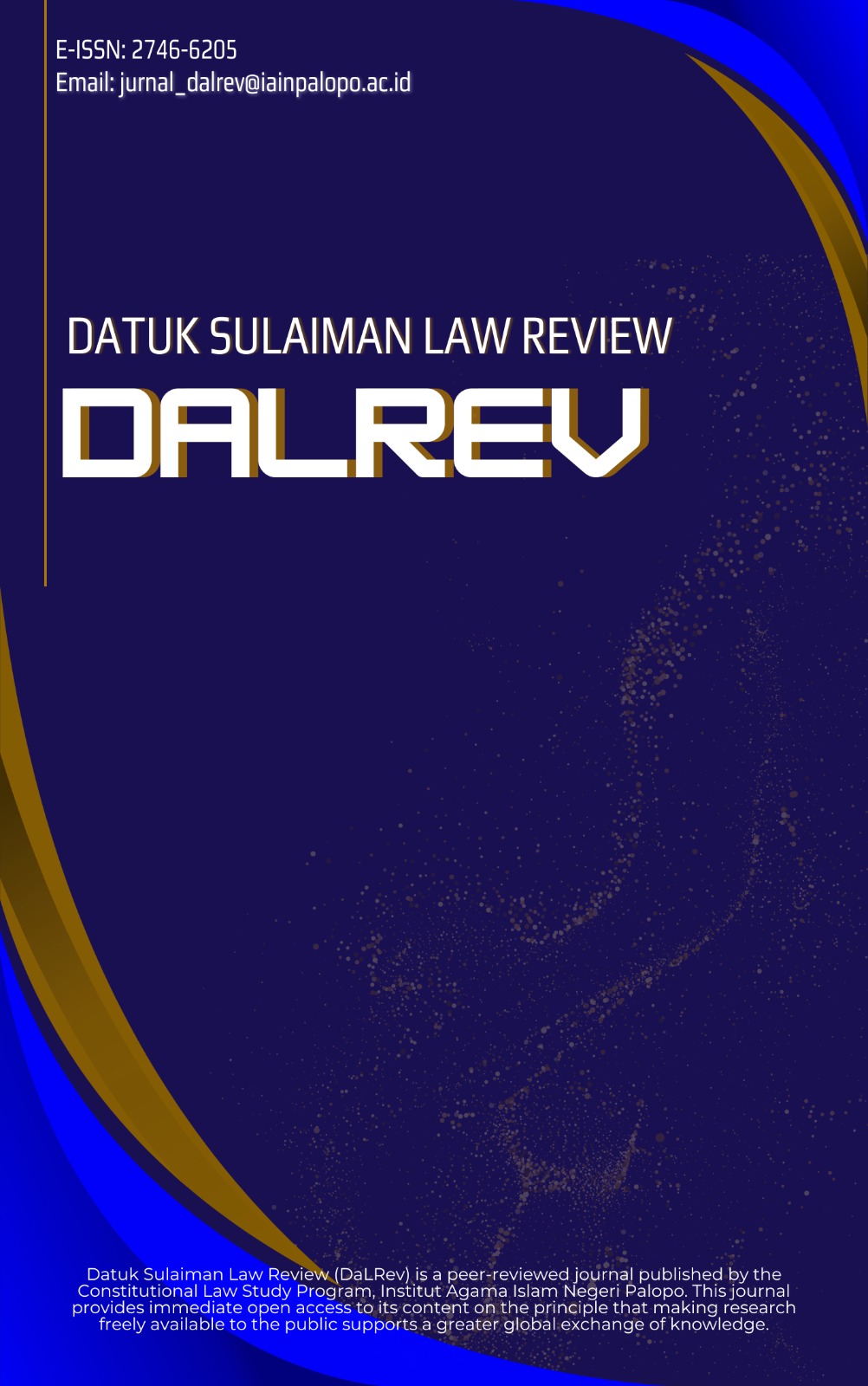Studi Komparatif Tentang Sistem Pemilihan Presiden di Indonesia Dalam Undang-Undang dan Fiqh Siyasah
DOI:
https://doi.org/10.24256/dalrev.v3i1.2586Kata Kunci:
General Election System, Presidential Election, Constitution, Fiqh SiyasaAbstrak
This thesis discusses a comparative study of the presidential election system in Indonesia in Islamic law and law.This study aims: to find out the provisions of the presidential election in Islamic law, tofind out the provisions of the presidential election in Islamic law, to find out the provisions of the presidential election in Islamic law, to find ou the mechanism of the presidential election in Indonesia in Fiqh Siyasah. The type of research used is library research using a normative juridical approach. Data collection techniques in this study are data collection by means of searching, reading and recording activities from written works in the form of books or sources related to the discussion. The results of the research from this thesis that the presidential election system in Indonesia in the laws and Islamic law contained in Law No. 7 of 2017 explained that the presidential and vice presidential election system is a series with the general election of members of the people’s representative council which is held once every five years, the presidential andvice presidential election system is conducted in a direct, public, free, secret, honest and fair manner The election of the president obtains strong support from the people so that they are able to carry out the functions of state government power in the context of achieving national goals. It is also explained that general elections in Islam are contained in Q.S An-Nisa Verse 59, it is explained that Allah obliges Muslims to obey ulil amri from among them. Ulim amri is a leader and commands to obey a leader. So, this shows that the obligation to appoint a leader for Muslims is obligatory, even the basic principles used in general elections already exist and are recognized by Islam. In the rules of Islamic law, the election of a fair leader is the goal, while the general election of a fair leader is the goal, while the general election is wasilah. As for the mechanism of the presidential election system in Indonesia and Islamic law, boh use deliberation as a method to elect a president. If in Islam deliberation to elect a president. If in Islam deliberation to elect the President, in Indonesia the model of Presidential election by the DPR is replaced by direct election by the people. In Islam also when a. When the president is elected, all the people must make a promise.
Referensi
Abdullah, H.Rozali, 2009, Mewujudkan Pemilu yang Lebih Berkualitas (PemiluLegislatif), Jakarta: Rajawali Pers.
Soerjono Soekanto, Pengantar Penelitian Hukum, Nomor Edisi 3 (Jakarta: UI Pres, 1986).
Soenarjo dkk.Al-Quran dan Terjemahannya, (Jakarta: Yayasan Penyelenggara/Penafsir Al-Quran, Departemen Agama RI.1990).
Fahmi, Khairul, 2011, Pemilihan Umum dan Kedaulatan Rakyat, Jakarta, RajaGrafindo Persada.
Regeh, Bintan Saragih, 1988, LembagaPerwakilan dan Pemilihan Umum di Indonesia, Jakarta, Gaya Media Pratama.
Tricahyo 2009. Reformasi Pemilihan Umum. Bandung:PT. Remaja Rosdakarya.
Sardiman, Sejarah 3 (Jakarta: Yudhistira Ghalia, 2006), 128
Masdar Farid Mas’udi, Siyasah Konstitusi UUD 1945 dalam Perspektif Islam, (Jakarta: Alvabet, 2010).
Jimly Asshiddiqie, Islam dan Kedaulatan Rakyat, (Jakarta: Gema Insani Press, 1995), Cet. Pertama.
Unduhan
Diterbitkan
Cara Mengutip
Terbitan
Bagian
Citation Check
Lisensi
Authors retain copyright and grant the journal right of first publication with the work simultaneously licensed under an Attribution-ShareAlike 4.0 International (CC BY-SA 4.0) (https://creativecommons.org/licenses/by-sa/4.0/) that allows others to share the work with an acknowledgement of the work's authorship and initial publication in this journal.
Authors are able to enter into separate, additional contractual arrangements for the non-exclusive distribution of the journal's published version of the work (e.g., post it to an institutional repository or publish it in a book), with an acknowledgement of its initial publication in this journal.
Authors are permitted and encouraged to post their work online (e.g., in institutional repositories or on their website) prior to and during the submission process, as it can lead to productive exchanges, as well as earlier and greater citation of published work (See the Effect of Open Access)














